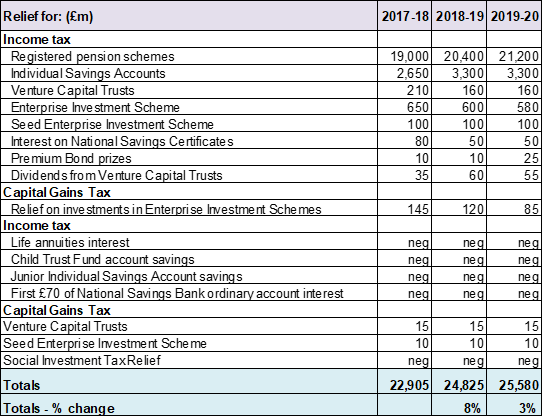Tax incentives on savings and investments hits record high of £25.6bn last year
• Incentives could be cut to cover coronavirus-driven public spending
• Savers should act now
Tax incentives granted to individuals on savings and investments in the UK hit a record high of £25.6bn in the last year, up 3% from £24.8bn the previous year*, says Salisbury House Wealth, the leading financial adviser.
Salisbury House Wealth says the Treasury will likely be looking for ways to increase tax receipts to cover huge coronavirus-driven public spending measures. In the Summer Statement on July 8, the Chancellor introduced further measures, including cuts to VAT and Stamp Duty.
One possible way of raising tax receipts would be to cut the level of tax incentives available on savings and investments.
The use of tax incentives is critical for individuals who want to maximise the value of their savings and investments. Incentives available include tax relief on pension contributions, Individual Savings Accounts (ISAs) and Venture Capital Trusts (VCTs).
The largest tax incentives gained by individuals last year were £21.2bn in tax relief on pension contributions and £3.3bn on ISAs. Please see table below.
Tim Holmes, Managing Director at Salisbury House Wealth, says: “Tax incentives can have a very powerful effect on driving savings growth so savers need to make sure that capitalise on them whilst they are still available.”
“Although cutting tax incentives on savings and investments could be easy target as the Treasury looks to increase tax receipts, the Government needs to exercise caution. The constant chipping away at tax incentives, particularly on pensions, undermines the attractiveness of savings to middle earners as well as high earners. It risks deterring individuals from saving enough for their retirement which could be detrimental further down the line.”
Encouraging individuals to make investments by offering tax reliefs also provides an important source of funding for businesses. Through the purchase of funds or direct purchases of shares, individuals provide a significant slice of the equity financing for businesses.
Data from the ONS shows UK individuals own 13.5% of the value of all UK quoted shares.
Tax incentives have also been important in encouraging private investors to fund smaller, high-risk businesses through VCTs and through the Enterprise Investment Scheme (EIS).
Between 2017/18 and 2018/19, there was an 8% increase in tax benefits granted on savings and investments. The slowdown of growth in the last year in comparison to previous years, is partly due to the cut in the maximum amount someone can pay into their pension each year tax free.
The reduction in tax benefits on investments through EIS has also contributed to the slowdown. This follows the introduction of more stringent rules in 2017 on what type of business qualifies for investment under the scheme. Tax benefits gained on EIS-qualifying investments fell 3% to £580m last year, down from £600m the year before.
Tim Holmes adds: “It is important that individuals do not base their investment decision making purely on whether that kind of tax relief is available. Tax reliefs should be secondary to the overall investment performance expected. Don’t let the tax savings tail wag the dog.”
Notes to Editors
Salisbury House Wealth is a leading financial advisor founded in 1986, and based in Leicester.
Salisbury House Wealth offers specialist professional advice to high net worth and mass affluent individuals on a range of financial products. These include mortgage and pension plans, investment programmes, inheritance tax plans and life insurance.

